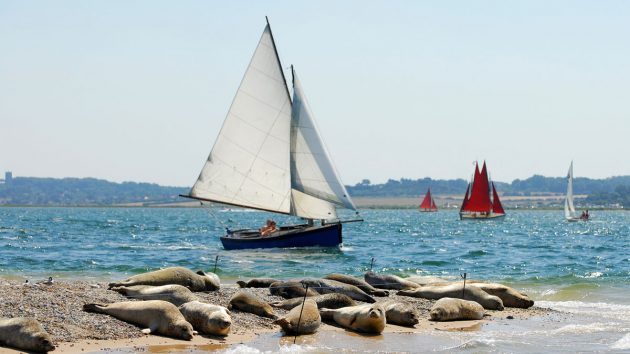Boaters are being asked to report seal deaths around the English and Welsh coastline and waterways to help protect the species
What should you do if you spot a dead seal while you are out on the water?
Boaters are being asked to report seal deaths around the coastline of England and Wales in order to help protect harbour and grey seals.
The Zoological Society of London (ZSL)’s Cetacean Stranding Investigation Programme (CSIP) wants to expand their research to try and understand the health of the two seal species, which are found in UK waters.
The programme has been running for 30 years and investigates whales, dolphins, porpoises, marine turtles and sharks that strand around the English and Welsh coast – including the smalltooth sand tiger shark stranded in Hampshire last weekend.

The study will look at harbour and grey seal (pictured) populations
The CSIP Project Manager and researcher at ZSL’s Institute of Zoology Rob Deaville said seals are a “keystone species, meaning that they play a crucial role maintaining biodiversity within their ecosystem, so any threats to them will have a knock-on effect on the marine animals they live alongside.”
“We know that dead seals are sadly routinely found on beaches around England and Wales, but without coordinated research, we simply don’t yet have a strong understanding of what is causing their deaths – or even on how many are dying every year – which presents a challenge to taking the right evidence-driven conservation action where any mortality may be due to human activities,” he said.
“We know from decades of investigating cetacean strandings that the reasons behind these events can be varied and complex. Expanding our remit into seal deaths too will help us build a detailed picture of the pressures that seals in UK waters are facing and how we can protect the future of these essential species.”
Continues below…
Types of seal and the best places to spot them from your boat in the UK
‘When angels fell, some fell on the land, some on the sea. The former are the faeries and the latter…
What should sailors do if they see marine wildlife in distress?
Following the discovery of a rare smalltooth sand tiger shark in the Solent, what should sailors do if they see…
UK cetaceans: How to spot and identify whales and dolphins from your boat
One spring day when I was a teenager, we were sailing across Poole Bay as we had many times before.…
UK seabirds: How to identify some of the most common breeds
Sailors have been watching seabirds for thousands of years. Early navigators in the Pacific used their knowledge of how far…
CSIP’s investigation into seal deaths comes over 20 years after the last large-scale systematic investigation into seal deaths in the England and Wales, when in 2002 the fatal disease phocine distemper virus (PDV) is estimated to have halved seal populations in the North Sea.
While over 4,300 incidences of dead seals were recorded in the UK during that year, there has been limited funding for long-term seal mortality investigation in the years since – drastically limiting the research needed for scientists and conservationists to understand the threats that these animals face.

Harbour seal mum-pup pair. Credit: Mònica Arso – SMRU
Rob Deaville monitoring seal deaths and population levels is “essential” for helping to spot any future outbreaks of PDV or other diseases such as influenza or mouth rot at an early stage.
“In light of recent positive cases of avian flu found in UK seals, we need to gain a better understanding of this new and emerging issue. We also need to learn more about the impacts on these iconic mammals from human activities, such as entanglement in fishing gear or marine plastics, ship-strikes, shooting and climate change. Investigating seal mortality may also help us gain a better understanding of the scale and extent of interactions between grey seals and other marine mammals.”

Both harbour and grey seals have died from phocine distemper virus around the coast of England and Wales. Credit: Gary K Smith/Alamy
The monitoring of seal deaths monitoring is being funded via an eight year grant from the Department for Environment, Food & Rural Affair.
It will be co-ordinated with partner organisations including the Cornwall Marine Pathology Team, Natural History Museum, Marine Environmental Monitoring and the Cornwall Wildlife Trust Marine Strandings Network.
Sightings of seal deaths in England and Wales can be reported to Cetacean Stranding Investigation Programme by calling 0800 652 0333.
Members of the public are advised not to approach or touch any dead seals spotted due to the risk of them carrying disease.
Enjoyed reading Boaters urged to report seal deaths?
A subscription to Practical Boat Owner magazine costs around 40% less than the cover price.
Print and digital editions are available through Magazines Direct – where you can also find the latest deals.
PBO is packed with information to help you get the most from boat ownership – whether sail or power.
-
-
-
- Take your DIY skills to the next level with trusted advice on boat maintenance and repairs
- Impartial in-depth gear reviews
- Practical cruising tips for making the most of your time afloat
-
-








